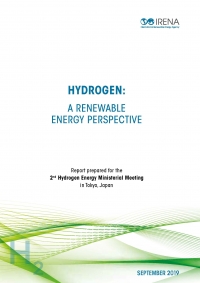IRENA: Hydrogen: A renewable energy perspective - September 2019 - eng (pdf) Избранное
Hydrogen has emerged as an important part of the clean energy mix needed to ensure a sustainable future. Falling costs for hydrogen produced with renewable energy, combined with the urgency of cutting greenhouse-gas emissions, has given clean hydrogen unprecedented political and business momentum.
This paper from the International Renewable Energy Agency (IRENA) examines the potential of hydrogen fuel for hard-to-decarbonise energy uses, including energy-intensive industries, trucks, aviation, shipping and heating applications. But the decarbonisation impact depends on how hydrogen is produced. Current and future sourcing options can be divided into grey (fossil fuel-based) blue (fossil fuel-based production with carbon capture, utilisation and storage) and green (renewables-based) hydrogen. Green hydrogen produced through renewable-powered electrolysis is projected to grow rapidly in the coming years.
Among other findings:
- Important synergies exist between hydrogen and renewable energy. Hydrogen can boost renewable electricity market growth and broaden the reach of renewable solutions.
- Electrolysers can add demand-side flexibility. In advanced European energy markets, electrolysers are growing from megawatt to gigawatt scale.
- Blue hydrogen is not inherently carbon free. This type of production requires carbon-dioxide (CO2) monitoring, verification and certification.
- Synergies may exist between green and blue hydrogen deployment, given the chance for economies of scale in hydrogen use or logistics.
- A hydrogen-based energy transition will not happen overnight. Hydrogen use is likely to catch on for specific target applications. The need for new supply infrastructure could limit hydrogen use to countries adopting this strategy.
- Dedicated hydrogen pipelines have existed for decades and could be refurbished along with existing gas pipelines. The implications of replacing gas abruptly or changing mixtures gradually should be further explored.
- Trade of energy-intensive commodities produced with hydrogen, including “e-fuels” could spur faster uptake or renewables and bring wider economic benefits.
Дополнительная информация
- Серия: Международные организации / IRENA
- Год: 2019
- Месяц: 9 (III квартал)
- Источник: IRENA - International Renewable Energy Agency


































